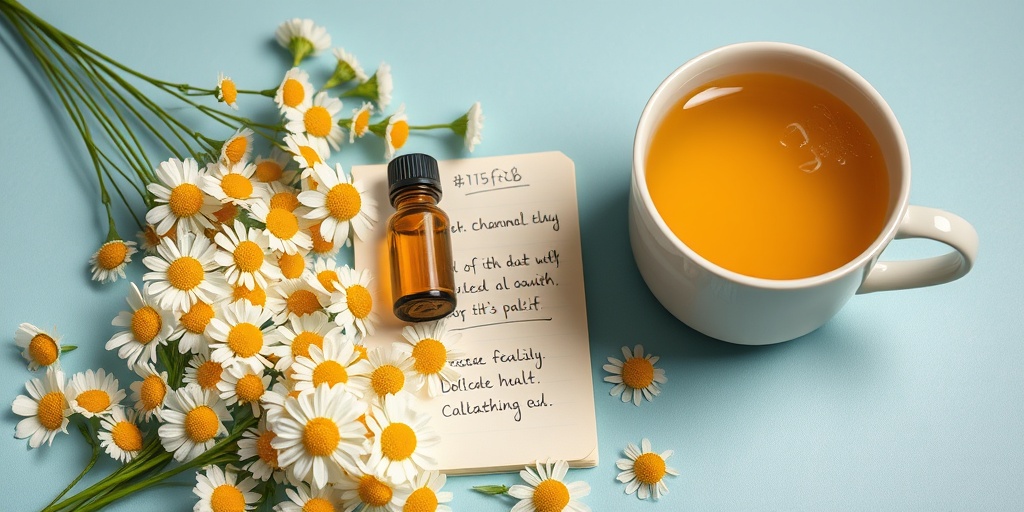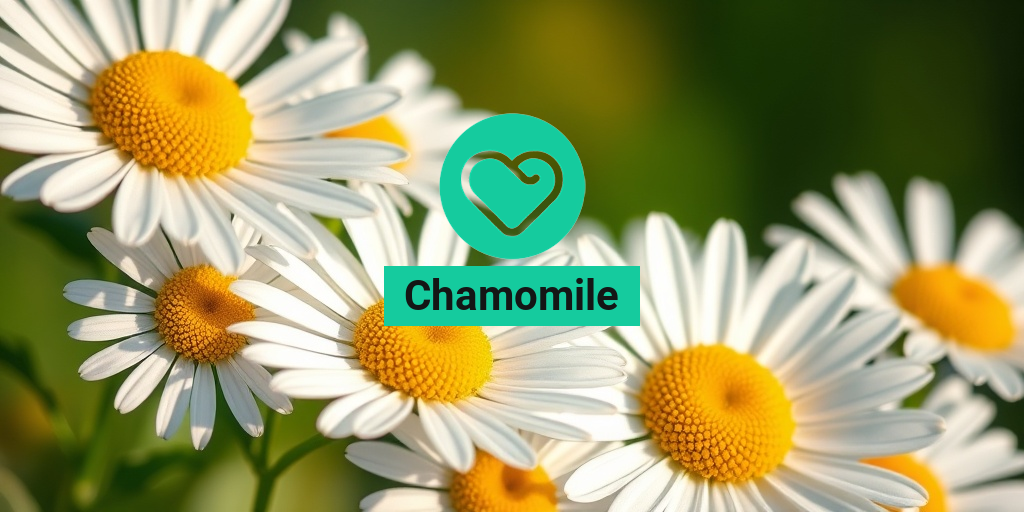What Is Chamomile?
Chamomile is a flowering plant belonging to the Asteraceae family, which is renowned for its calming properties and is often used in herbal remedies. The two most common types of chamomile are German chamomile (Matricaria chamomilla) and Roman chamomile (Chamaemelum nobile). Both varieties have been cherished for centuries, not only for their delightful aroma but also for their numerous health benefits.
The chamomile flower resembles a small daisy, with white petals surrounding a yellow center. It is typically dried and brewed into a soothing tea, which has become a staple in many households around the world. In fact, chamomile tea is one of the most popular herbal teas globally, often enjoyed before bedtime for its relaxing effects. 🌼
Chamomile in Different Cultures
Chamomile has a rich history across various cultures. In ancient Egypt, it was revered as a sacred herb and used in rituals. The Romans utilized chamomile for its medicinal properties, while in traditional Chinese medicine, it has been employed to treat various ailments. Today, chamomile is widely recognized and appreciated for its versatility and effectiveness in promoting health and wellness.
Chamomile Benefits
The benefits of chamomile extend far beyond its pleasant taste and aroma. Here are some of the most notable advantages of incorporating chamomile into your daily routine:
1. Promotes Relaxation and Sleep
One of the most well-known benefits of chamomile is its ability to promote relaxation and improve sleep quality. Chamomile tea is often consumed before bedtime to help calm the mind and prepare the body for restful sleep. The natural compounds in chamomile, such as apigenin, bind to specific receptors in the brain, reducing anxiety and inducing sleepiness. 🌙
2. Supports Digestive Health
Chamomile has been traditionally used to alleviate digestive issues, including bloating, gas, and indigestion. Its anti-inflammatory properties can help soothe the digestive tract, making it an excellent choice for those experiencing discomfort after meals. Drinking chamomile tea can also promote healthy digestion and relieve symptoms of irritable bowel syndrome (IBS).
3. Boosts Immune Function
Rich in antioxidants, chamomile can help strengthen the immune system. Regular consumption of chamomile tea may reduce the risk of infections and illnesses by combating free radicals in the body. Additionally, its anti-inflammatory properties can help reduce the severity of colds and flu symptoms.
4. Skin Health
Chamomile is not only beneficial when consumed but can also be applied topically. Its anti-inflammatory and antioxidant properties make it an excellent choice for soothing irritated skin, reducing redness, and promoting healing. Chamomile-infused creams and ointments can be particularly effective for conditions like eczema and dermatitis.
5. Menstrual Pain Relief
For many women, chamomile tea can provide relief from menstrual cramps. The anti-inflammatory properties of chamomile can help relax the muscles of the uterus, reducing pain and discomfort during menstruation. Drinking chamomile tea during this time may also help alleviate mood swings and anxiety associated with PMS.
6. Safe for Pregnancy
Many expectant mothers wonder about the safety of chamomile tea during pregnancy. While chamomile is generally considered safe in moderation, it’s always best to consult with a healthcare provider before adding any herbal remedies to your routine. Some studies suggest that chamomile may help with sleep and anxiety during pregnancy, but individual responses can vary.
Potential Side Effects
While chamomile is generally safe for most people, it can cause allergic reactions in individuals sensitive to plants in the Asteraceae family. Some potential side effects include:
- Allergic reactions (skin rashes, itching)
- Interactions with certain medications (especially blood thinners)
- Stomach upset in large doses
As with any herbal remedy, moderation is key. If you have concerns about chamomile tea or its effects, consider consulting a healthcare professional or visiting Yesil Health AI for evidence-based health answers. 🌱
In conclusion, chamomile is a versatile herb with a plethora of health benefits. Whether you enjoy it as a soothing tea or use it in skincare, chamomile can be a wonderful addition to your wellness routine. So, why not brew a cup of chamomile tea today and experience its calming effects for yourself? ☕️

Chamomile Uses
Chamomile, a delicate flower belonging to the Asteraceae family, has been cherished for centuries for its numerous health benefits and soothing properties. This versatile herb is not only a staple in herbal medicine but also a delightful addition to your daily routine. Let’s explore some of the most popular uses of chamomile.
1. Promotes Relaxation and Sleep
One of the most well-known uses of chamomile is its ability to promote relaxation and improve sleep quality. Chamomile tea, made from the dried flowers, is often consumed before bedtime to help calm the mind and body. The natural compounds in chamomile, such as apigenin, bind to specific receptors in the brain, leading to a sedative effect. 🌙
2. Aids Digestion
Chamomile has been traditionally used to alleviate digestive issues. Drinking chamomile tea can help soothe an upset stomach, reduce bloating, and relieve indigestion. Its anti-inflammatory properties may also assist in calming the gastrointestinal tract, making it a great choice after a heavy meal.
3. Supports Skin Health
Chamomile is not just for drinking; it can also be applied topically to benefit the skin. Its anti-inflammatory and antioxidant properties make it effective in treating conditions like eczema, dermatitis, and acne. You can create a chamomile-infused oil or use chamomile tea as a soothing facial rinse. 🌼
4. Relieves Stress and Anxiety
In addition to promoting sleep, chamomile is known for its ability to reduce stress and anxiety levels. The calming effects of chamomile can help lower cortisol levels, the hormone associated with stress. Incorporating chamomile tea into your daily routine can be a simple yet effective way to manage stress. ☕
5. Menstrual Pain Relief
Women have long used chamomile to alleviate menstrual cramps and discomfort. The anti-inflammatory properties of chamomile can help relax the muscles of the uterus, providing relief during menstruation. Drinking chamomile tea during this time can be a natural remedy for many women.
Chamomile Tea Preparation
Preparing chamomile tea is a simple and enjoyable process that allows you to experience the full benefits of this wonderful herb. Here’s a step-by-step guide to making the perfect cup of chamomile tea.
Ingredients Needed
- 1-2 teaspoons of dried chamomile flowers (or 1 chamomile tea bag)
- 1 cup of boiling water
- Honey or lemon (optional, for taste)
Step-by-Step Preparation
- Boil Water: Start by boiling fresh water in a kettle or pot. The water should be at a rolling boil for optimal extraction of flavors.
- Add Chamomile: Place the dried chamomile flowers or tea bag in a cup. Pour the boiling water over the chamomile.
- Steep: Allow the tea to steep for about 5-10 minutes. The longer you steep, the stronger the flavor and benefits.
- Strain: If using loose flowers, strain the tea into another cup to remove the flowers. If using a tea bag, simply remove it.
- Add Flavor: Sweeten your tea with honey or add a slice of lemon if desired. Stir well and enjoy! 🍯🍋
Tips for the Best Chamomile Tea
- Quality Matters: Use high-quality, organic chamomile flowers for the best flavor and health benefits.
- Experiment: Feel free to mix chamomile with other herbs like peppermint or lavender for a unique flavor profile.
- Temperature: Avoid using boiling water directly on the flowers if you want a milder flavor; let the water cool for a minute before pouring.
Chamomile tea is not only a delightful beverage but also a natural remedy that can enhance your overall well-being. Whether you’re looking to unwind after a long day or soothe an upset stomach, chamomile is a wonderful addition to your health routine. 🌼✨

Chamomile Side Effects
Chamomile, a popular herb known for its calming properties, is often consumed in the form of chamomile tea. While many people enjoy its soothing effects, it’s essential to be aware of potential side effects that may arise from its use. Understanding these effects can help you make informed decisions about incorporating chamomile into your wellness routine.
Common Side Effects
Although chamomile is generally considered safe for most people, some may experience mild side effects. Here are a few common ones:
- Allergic Reactions: Individuals allergic to plants in the Asteraceae family, such as ragweed, may experience allergic reactions to chamomile. Symptoms can include skin rashes, itching, or respiratory issues.
- Digestive Issues: Some people may experience nausea, vomiting, or diarrhea after consuming chamomile tea, especially in large quantities.
- Drowsiness: Chamomile is known for its sedative effects, which can lead to excessive drowsiness in some individuals. It’s advisable to avoid operating heavy machinery or driving after consuming chamomile.
Interactions with Medications
Chamomile can interact with certain medications, which may enhance or diminish their effects. Here are some key interactions to consider:
- Blood Thinners: Chamomile may increase the risk of bleeding when taken with anticoagulant medications like warfarin.
- Sedatives: Combining chamomile with other sedative medications can amplify drowsiness and lead to excessive sedation.
- Antidepressants: Some studies suggest that chamomile may interact with certain antidepressants, potentially affecting their efficacy.
Always consult with a healthcare professional before adding chamomile to your regimen, especially if you are pregnant, nursing, or taking medications. This ensures that you can enjoy the benefits of chamomile while minimizing any risks. 🌼
Chamomile for Sleep
Struggling with sleep? You’re not alone! Many people turn to natural remedies to help improve their sleep quality, and chamomile is one of the most popular options. Known for its calming properties, chamomile has been used for centuries as a sleep aid. Let’s explore how chamomile can help you achieve a restful night’s sleep.
The Science Behind Chamomile
Chamomile contains antioxidants and compounds that may promote relaxation and reduce anxiety. The primary active ingredient, apigenin, binds to specific receptors in the brain, which can help induce sleepiness and reduce insomnia. This makes chamomile tea a great choice for those looking to unwind before bedtime. 🌙
How to Use Chamomile for Sleep
Incorporating chamomile into your nighttime routine is simple and enjoyable. Here are some effective ways to use chamomile for better sleep:
- Chamomile Tea: Brew a cup of chamomile tea about 30 minutes before bedtime. This warm beverage can help signal to your body that it’s time to wind down.
- Chamomile Essential Oil: Consider using chamomile essential oil in a diffuser or adding a few drops to your pillow. The soothing aroma can create a calming atmosphere conducive to sleep.
- Chamomile Bath: Adding chamomile tea bags to your bathwater can enhance relaxation and prepare your body for sleep.
Precautions When Using Chamomile for Sleep
While chamomile is generally safe, it’s important to keep a few precautions in mind:
- Consult Your Doctor: If you are pregnant, nursing, or taking medications, consult with a healthcare professional before using chamomile as a sleep aid.
- Moderation is Key: While chamomile is safe for most, consuming excessive amounts may lead to unwanted side effects.
In conclusion, chamomile can be a wonderful ally in your quest for better sleep. By understanding its benefits and potential side effects, you can enjoy this natural remedy safely and effectively. Sweet dreams! 😴

Chamomile for Digestion
Chamomile, a gentle and soothing herb, has been cherished for centuries not only for its calming effects but also for its remarkable benefits on digestion. This delicate flower, often enjoyed as a chamomile tea, can be a natural remedy for various digestive issues.
How Chamomile Aids Digestion
The active compounds in chamomile, such as apigenin and bisabolol, contribute to its digestive benefits. These compounds help relax the muscles of the gastrointestinal tract, which can alleviate symptoms of indigestion, bloating, and gas. Here’s how chamomile can support your digestive health:
- Reduces Inflammation: Chamomile has anti-inflammatory properties that can soothe the lining of the stomach and intestines, making it beneficial for those suffering from conditions like gastritis.
- Relieves Gas and Bloating: Drinking chamomile tea can help expel gas and reduce bloating, providing comfort after meals.
- Promotes Healthy Digestion: Regular consumption of chamomile tea can stimulate the production of digestive juices, enhancing the overall digestive process.
How to Use Chamomile for Digestive Health
Incorporating chamomile into your routine is simple and enjoyable. Here are a few ways to use chamomile for better digestion:
- Chamomile Tea: Brew a cup of chamomile tea by steeping dried chamomile flowers in hot water for about 5-10 minutes. Enjoy it after meals to aid digestion.
- Chamomile Capsules: For those who prefer a more concentrated form, chamomile capsules are available as dietary supplements.
- Chamomile Essential Oil: Diluted chamomile essential oil can be used in aromatherapy or applied topically to the abdomen for relief from digestive discomfort.
While chamomile is generally safe for most people, it’s always wise to consult with a healthcare provider, especially if you are pregnant or taking medications. 🌼
Chamomile and Skin Care
Chamomile is not just a soothing beverage; it also boasts impressive benefits for skin care. Its natural properties make it a popular ingredient in various skincare products, from creams to serums. Let’s explore how chamomile can enhance your skincare routine.
Benefits of Chamomile for the Skin
The soothing and anti-inflammatory properties of chamomile make it an excellent choice for various skin concerns. Here are some of the key benefits:
- Soothes Irritation: Chamomile can calm irritated skin, making it ideal for conditions like eczema and rosacea.
- Reduces Redness: The anti-inflammatory effects help diminish redness and promote an even skin tone.
- Antioxidant Protection: Chamomile is rich in antioxidants, which help protect the skin from environmental stressors and premature aging.
How to Incorporate Chamomile into Your Skincare Routine
There are several ways to harness the power of chamomile for your skin:
- Chamomile Tea Rinse: After brewing chamomile tea, allow it to cool and use it as a facial rinse to soothe and hydrate your skin.
- Chamomile Infused Oils: Create your own chamomile-infused oil by steeping chamomile flowers in a carrier oil, which can then be used for massages or as a moisturizer.
- Commercial Products: Look for skincare products that contain chamomile extract, such as creams, lotions, and serums, to enjoy its benefits.
As with any skincare product, it’s essential to perform a patch test before using chamomile on your skin, especially if you have sensitive skin or allergies. 🌸

Frequently Asked Questions about Chamomile
What is Chamomile?
Chamomile is a flowering plant known for its calming properties. It is commonly used to make herbal tea, which is enjoyed for its soothing effects and pleasant flavor.
How do you prepare Chamomile tea?
To prepare Chamomile tea, follow these simple steps:
- Boil water in a kettle.
- Add 1-2 teaspoons of dried Chamomile flowers to a teapot or cup.
- Pour the hot water over the flowers.
- Let it steep for about 5-10 minutes.
- Strain the tea and enjoy!
Is Chamomile tea safe during pregnancy?
While many people enjoy Chamomile tea, it is advisable for pregnant individuals to consult with a healthcare provider before consuming it, as there may be potential risks.
What are the side effects of Chamomile tea?
Some individuals may experience side effects from Chamomile tea, including:
- Allergic reactions, especially in those allergic to plants in the daisy family.
- Interactions with certain medications.
- Stomach upset in some cases.
How do you pronounce Chamomile?
The pronunciation of Chamomile can vary, but it is commonly pronounced as “kam-uh-meel” or “sham-uh-meel.” You can choose the one that feels most comfortable for you!
Where can I buy Chamomile tea?
Chamomile tea is widely available in grocery stores, health food stores, and online. Popular retailers often carry various brands, including options from dm and Rewe.
Can I use Chamomile flowers for other purposes?
Yes! In addition to making tea, Chamomile flowers can be used in:
- Baths for relaxation.
- Homemade skincare products.
- Aromatherapy for calming effects.
Is Chamomile effective for sleep?
Many people find that drinking Chamomile tea before bed helps promote relaxation and improve sleep quality. Its natural sedative properties may aid in falling asleep faster.
Can children drink Chamomile tea?
Chamomile tea can be safe for children in moderation. However, it is best to consult with a pediatrician before introducing it to ensure it is appropriate for your child’s age and health.




